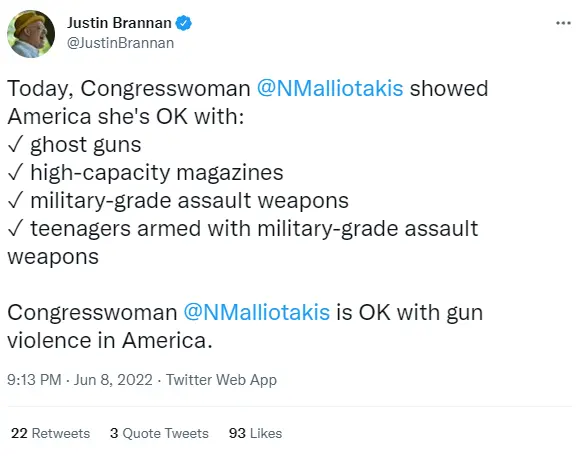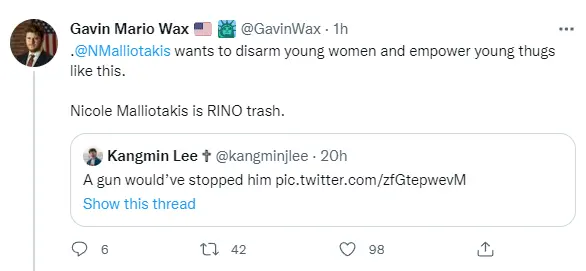On June 8th, 2022, in the wake of a horrific series of mass shootings across the United States, the U.S. House of Representatives voted on a package of mild gun-reform legislation. Nicole Malliotakis, who represents Bay Ridge, Staten Island, Dyker Heights, Bensonhurst, and Bath Beach in Brooklyn, New York, was among those who voted on the legislation.
However, if you were to use social media as a metric, it might be hard to figure out exactly how she voted.
Many Democratic lawmakers were quick to attack Malliotakis for blocking common-sense gun reforms. They listed a series of key components of the bill, including the banning of Ghost Guns, limiting civilian ownership of gun magazines holding over fifteen rounds, restricting teenagers from purchasing assault weapons, and more.

Confusingly, however, you may also have seen howls of disapproval from the far-right gun lobby. Malliotakis is being ripped to shreds as a RINO (Republican in name only) and a traitor to the increasingly incalcitrant base of her party, which demands constant adherence to an increasing number of extremist litmus tests.

The Protecting Our Kids Act
So if you were to try to parse out the truth online, you may have been presented with conflicting information. Some authoritative sources said she voted against it. Others clearly state she supported various measures. What’s the truth? The answer is classic political doublespeak: in a backfired attempt to play both sides, she did both.
In the House of Representatives, the bill that was put to a vote was known as H.R.7910 – Protecting Our Kids Act. It was voted on as a single official bill, containing multiple stipulations. They included:
- Title I: Raise The Age. Prohibiting the sale or transfer of assault weapons to people under 21 years of age
- Title II: Prevent Gun Trafficking. Closing loopholes in federal gun trafficking laws, including addressing “straw purchasers”, people who purchase guns on behalf of those who otherwise cannot pass a background check.
- Title III: Untraceable Firearms: Create a framework to regulate ghost guns (untraceable guns unknown to law enforcement or government regulators).
- Title IV: Safe Storage: Create a voluntary best-practices guide and tax credit for those who safely secure their firearms, as well as a $250 fine for anyone who fails to safely store a gun which is taken by an unauthorized user (such as a child) and who goes on to use that gun to injure or kill someone.
- Title V: Closing The Bump Stock Loophole. Further regulate bump stocks, which were used to make many guns fire faster, mimicking automatic and semiautomatic assault weapons.
- Title VI: Keep Americans Safe. Prohibit civilians from owning large-capacity gun magazines that can hold over 10 rounds of ammunition at once.
- Title VII: Mandating an annual report by the Attorney General to Congress, analyzing the demographic data of those who are federally ineligible to purchase a firearm.
Nicole Malliotakis voted against this bill.
Procedural Votes
However, before the final passage of the Protect Our Children Act, a procedural vote was held on each of the individual components of the bill. At this stage, the individual pieces of the legislation could have been removed from the overall bill. Because of the Democratic majority in the House of Representatives, there was no real risk of that happening. These procedural votes were primarily intended to get every politician on the record about the specific issues they supported or opposed.
Importantly, these votes did not actually pass any laws. They were simply “edits” to the larger bill, whose passage would then be voted on later.
Here’s how Nicole Malliotakis voted on these individual components.
| Title | Malliotakis’s Vote | Roll Call # |
|---|---|---|
| Raise the Age | Yes | No. 237 |
| Prevent Gun Trafficking | Yes | No. 238 |
| Untraceable Firearms | Yes | No. 239 |
| Safe Storage | No | No. 240 |
| Closing The Bump Stock Loophole | Yes | No. 241 |
| Keep Americans Safe (High Capacty Magazines) | No | No. 242 |
| Congressional Background Check Report | Yes | No. 243 |
These individual procedural votes ended up being the source of much of the right-wing hate being directed at Malliotakis. It allowed die-hards to claim she voted in favor of infringing on gun rights. And in a way, she did. She was given an opportunity to vote according to her beliefs, and she did so.
Voting Against The Bill Shortly Afterward
Nicole Malliotakis then turned around and voted against the entire bill… even the parts of it she was in favor of. And let’s be clear, she was in favor of most of it. But she was willing to scrap the entire thing because she disliked the idea of giving people a $250 fine if law enforcement could someone left their gun in an unprotected area and their child ended up shooting someone with it. Or perhaps she disliked the idea of a gun owner being limited to ten rounds before being forced to reload. (In our opinion, if you need more than ten consecutive rounds without pausing to hunt an elk, you probably shouldn’t own a gun.)
| Bill | Malliotakis’s Vote | Roll Call # |
|---|---|---|
| H.R. 7910 – Protecting Our Kids Act | No | No. 245 |
The most likely reason for this flip-flop is that she is playing both sides. We expect her to send campaign literature to families later this year touting her “votes” to protect kids from gun violence. But we also expect to see her talk up her willingness to defend the second amendment against “dangerous” Democrats.
In fact, that spin has already begun.
Malliotakis’s Explaination
On June 9th, the next day, Malliotakis said the reason for voting against the omnibus bill was because it was “wrong, constitutionally-suspect and, unlike the process proceeding in the United States Senate, represented a partisan overreach rather than thoughtful consensus-building. That’s why I voted against the Democrats’ omnibus bill last night.”
This is despite the fact that she voted for the vast majority of the stipulations in the bill. Clearly, some middle ground had already been reached. Her own vote shows that the legislation was very far from “partisan overreach”, and indeed was quite mild in terms of what it aimed to achieve.
As to “constitutionally-suspect”, this may be in reference to the gun storage safety regulations. These regulations are voluntary, guided by a best-practices document to be issued by the government. But Malliotakis made no reference to constitutionality, instead stating, “Talk to any law-abiding gun owner and they will tell you that in order to protect themselves and their property they need to have quick access to their firearms. Requiring multiple steps to access their legal firearm can be the difference between life and death in a life-threatening situation.”
In short, Malliotakis’s opposition to politely asking gun owners safely store their weapons is that it’s too inconvenient in the heat of the moment. However, guns are more likely to be used by domestic abusers or to accidentally shoot loved ones mistaken as intruders as they are to be used to thwart a home invasion.